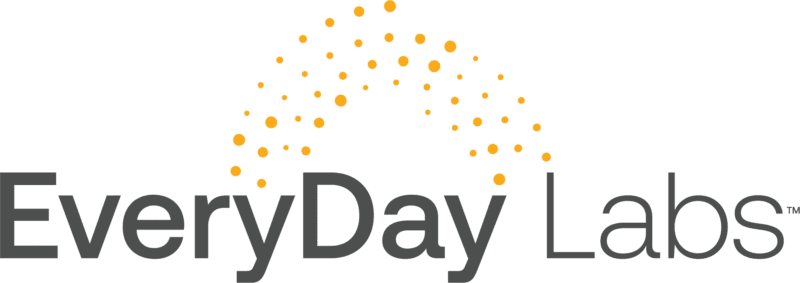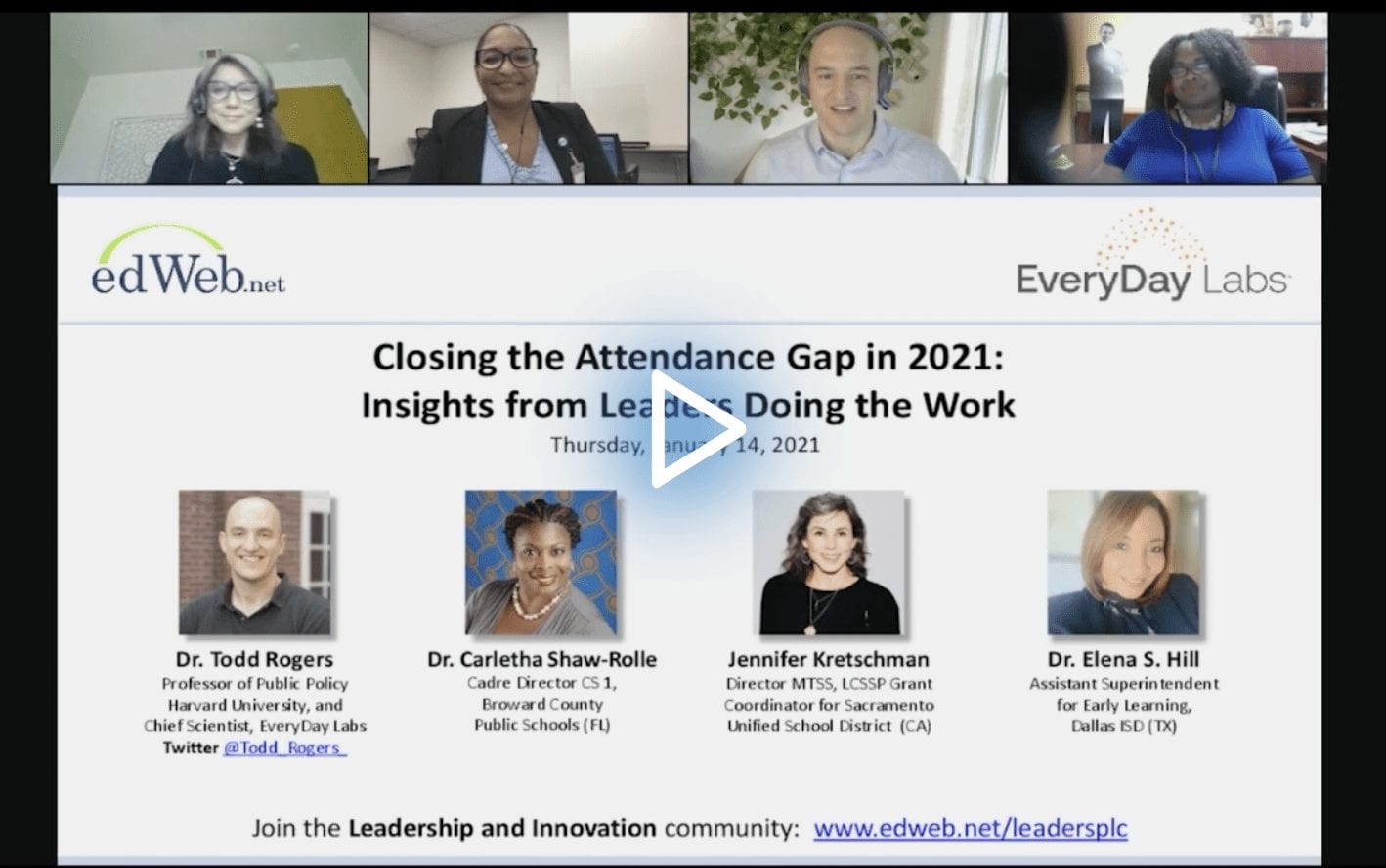Insights from Leaders on Closing the Attendance Gap
By Eileen Belastock
WATCH THE EDLEADER PANEL RECORDING
Even before COVID-19 created online, remote, and hybrid learning environments in school districts across the country, most district and school leaders struggled with chronic absenteeism in their schools. Researchers like Dr. Todd Rogers, Professor of Public Policy at Harvard University and Chief Scientist at EveryDay Labs, have tirelessly worked with school districts to identify, develop and implement strategies to reduce absenteeism at scale.
When the pandemic hit, communities experienced the highest rate of chronic absenteeism due to students and families learning from home. In a recent edWeb edLeader Panel, sponsored by EveryDay Labs, Dr. Rogers, along with Dr. Carletha Shaw-Rolle, Cadre Director CS 1, Broward County Public Schools (FL), Dr. Elena S. Hill, Assistant Superintendent for Early Learning, Dallas Independent School District (TX), and Jennifer Kretschman, Director MTSS, LCSSP Grant Coordinator, Sacramento City Unified School District (CA), discussed the key topics relating to closing the unprecedented attendance gap in 2021.
Chronic absenteeism is on the rise this year at a time when it is critical that students are present, engaged, and participating in their learning. Sitting in an in-person classroom environment did not have the challenges presented in our remote learning environments where students sit at home in front of a computer screen. Can we define attendance if students simply log onto their Google Classroom or submit an assignment? The presenters on this panel think not and recommend that schools begin to look beyond the traditional definition of attendance and measure attendance through the lens of student engagement and participation. Focusing on how to engage students more fully has the potential to reduce chronic absenteeism significantly.
Disturbing chronic absenteeism trends identified during this panel involves two groups: early learners and marginalized students. The early learners developmentally struggle with learning, engaging, and comprehend Zoom-type learning environments. Difficult socio-economic conditions at home challenge marginalized students to participate in online classes fully or at all.
There are two strategies the presenters recommend to increase student attendance that results in engagement, connection, and educational growth. The first strategy is to examine what teachers are doing in the classroom. There are many challenges classroom teachers face with replicating brick-and-mortar learning environments in a virtual world. The entire school community must participate in self-reflection to determine what they can do differently to engage students. This reflection includes asking questions such as: “So if I’m in a teacher role, am I doing something in the classroom that’s resulting in students wanting to show up to class? Am I hitting home with students? Am I making sure that I have culturally relevant texts, and am I making sure that students have an experience that means something to him or her so they will want to come?” School administrators have the opportunities to work with teachers on redefining and reimaging education that is both engaging and inviting for students.
Engaging families can be another way to get students involved in our classrooms in more authentic ways. This partnership happens when trust is built between families and the school community through outreach and support and families see the school district as a resource to connect them to whatever materials, supplies, or services they need for their students. The presenters highly recommend exhausting every resource and connecting with outside assistance if necessary.
The presenters agreed that why students are not coming to school has changed since schools transitioned to remote learning. The reasons uncovered by the types of supports utilized include sending social workers, teachers, and staff into homes to discover the challenges families and students have with the types of remote learning we are employing. Dr. Shaw-Rolle said the “most significant thing for us is the ‘whys’ and providing the right support to students to either get them back in school and face-to-face learning or respond to the types of learning they have to do in the remote environment.”
This edWeb broadcast was sponsored by EveryDay Labs.
WATCH THE EDLEADER PANEL RECORDING
About the Presenters
Dr. Carletha Shaw-Rolle is the Cadre Director CS 1 in the Broward County Public Schools (FL). She is a 28-year educator who works with principals and school staff to help enrich organizational culture to improve school performance. She is a Barbara L. Jackson Scholar and has presented her work on the relationship among leader influence actions, organizational culture, and performance outcomes at the University Council of Educational Administration (UCEA) and the American Educational Research Administration (AERA). She served as President of the Broward County Chapter of the National Alliance of Black School Educators for more than a decade, fighting for equitable treatment, resources, and opportunities for students of African descent. In 2015, Legacy Magazine named her one of 40 Most Influential Women in Florida. Most recently, Dr. Shaw-Rolle served on the crisis response team for Marjory Stoneman Douglas High School in Parkland, Florida where several people lost their lives to a school shooter. Dr. Shaw-Rolle holds a bachelor’s degree in mathematics and a master’s degree in education from the University of Florida. She recently earned a Ph.D. in educational leadership from Florida Atlantic University.
Dr. Elena S. Hill serves as Assistant Superintendent for Early Learning in Dallas ISD. In her previous roles, she served as Executive Director of a group of schools for six years, an elementary principal for four years, and two years as an assistant principal. She is a proud Dallas ISD graduate who began her career as a pre-kindergarten teacher. At the elementary level, Dr. Hill also taught kindergarten and elementary reading intervention to third through sixth graders. She earned her bachelor’s degree in child development from the University of North Texas, two master’s degrees in elementary education and educational leadership from Texas A&M Commerce and the University of North Texas respectively, and a doctorate in educational leadership and policy from The University of Texas at Austin.
Jennifer Kretschman, Director MTSS, LCSSP Grant Coordinator, Sacramento City Unified School District (CA)
About the Moderator
Dr. Todd Rogers is a professor of public policy at Harvard Kennedy School and Chief Scientist at EveryDay Labs. He is a behavioral scientist who studies how mobilizing and empowering students’ social networks can increase student success. He founded the Student Social Support R&D Lab at Harvard to use data and behavioral science to develop and prove scalable, high ROI interventions that mobilize and empower students’ social support systems to improve achievement. As Chief Science Adviser, Todd leads EveryDay Labs’ research and innovation, leveraging evidence from EveryDay Labs’ RCTs, research from the Harvard S3 Lab, and academic research to improve the effectiveness of the programs. Todd received his Ph.D. jointly from Harvard’s Department of Psychology and Harvard Business School.
Join the Community
Leadership and Innovation is a free professional learning community on edWeb.net that serves as an online forum for collaboration on leadership and innovation in schools to meet the needs of the next generation.

Eileen Belastock, CETL is the Director of Technology and Information for Nauset Public Schools, MA, and also works with edWeb.net to write articles on their professional learning edWebinars. You can follow Eileen on Twitter @EileenBelastock.




Comments are closed.